At South Florida International Water Polo Tournament, Emphasis is on International
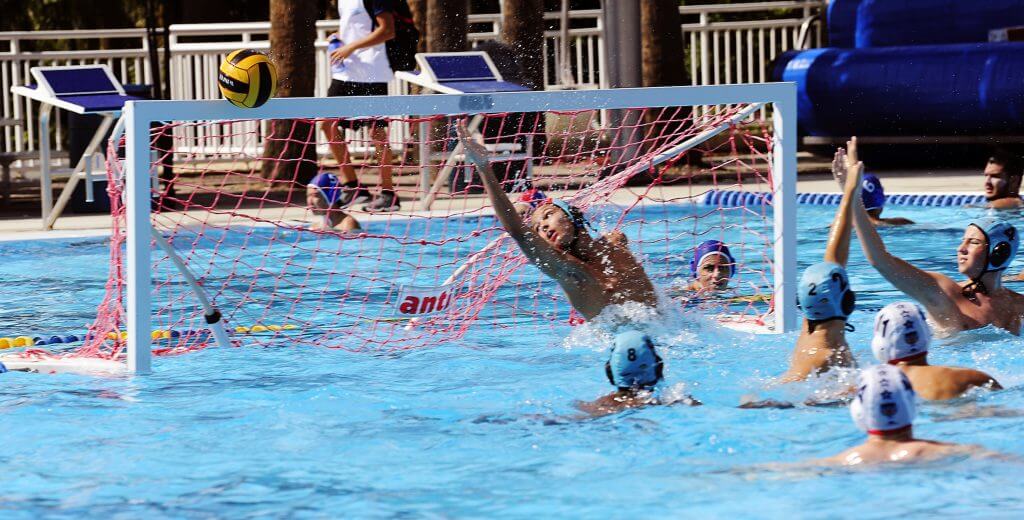
Editor’s Note: Swimming World is down in Coral Springs, Florida for the annual South Florida International Tournament. Offered by Michael Goldenberg, his daughter Elina and extensive coaching staff from the South Florida Water Polo Club, this annual age group tournament—started in 2003 by Istvan Csendes, James Shomaker and Bruce Wigo—draws teams from all over the East Coast as well as from the Bahamas, Calgary, Chicago, Peru, Puerto Rico, Rome and other locations.
Coral Springs, FL. The atmosphere for water polo at the Coral Springs Aquatics Center on a Sunday afternoon in February is as captivating as anywhere in America, including California, where the sport thrives as part of the culture.
Three pools teem with action, as polo players from parts distant and near splash about in crystal deep blue water that gleams in the sunlight. Parents scurry hither and yon, speaking animatedly to their children, coaches or even the random spectator on the scene to take in the phenomenon of the Florida outdoor polo scene.
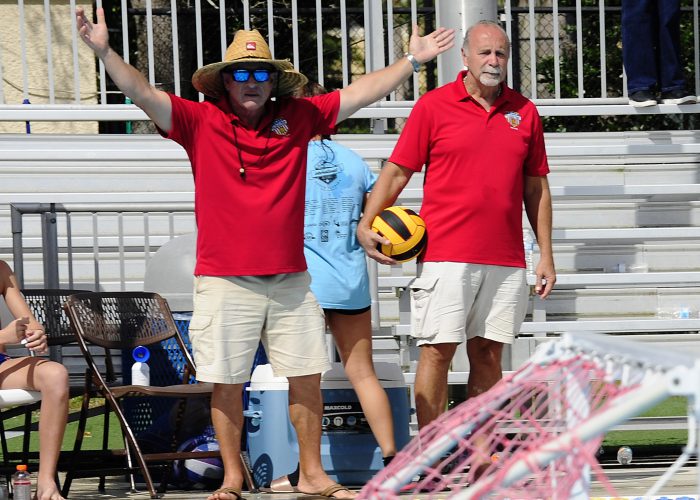
Michael Goldenberg is the maestro conducting the East Coast’s best age group tournament. Photo Courtesy: Annie Tworoger / 3rd & Ocean
At the center of the frenetic activity is Michael Goldenberg. Sporting a mottled straw hat to fend off the intense sunshine, the brawny Goldenberg—he looks more linebacker than the referee, coach and high school teacher that he is—accompanied by his equally imposing daughter Elina, stands out among the throng. Both are constantly on the move, herding teams for photographs, dictating where signage should be placed, and, in the father’s case, as a long three days of 100+ matches draws to a close, doing what he does best—directing South Florida Water Polo’s 16U and 19U boys, hopefully to gold medals.
After all the teams are gone, and while friends and player families are clearing out the gear and tables, Goldenberg takes a deep breath and contemplates what he and his club have wrought.
“This tournament is like a trademark already,” he said, finally removing the battered chapeau that has been perched on his head for days. “People around the U.S. and people outside the country know about this tournament, they start preparing for it a long time in advance. It’s known for high quality games, high quality officiating—and we’d like to keep it that way.”
Recognizing that the tournament—now in its 17th year—is a highly desirable destination for so many clubs that don’t get into the California scene, Goldenberg acknowledges that his creation has become a leading indicator of East Coast polo’s health.
“That’s very important, because if we want to grow water polo as a sport, we have to present a good product. Otherwise, you’re not going to get anybody.”
A competition with broad appeal and a diverse turnout
Based on this year’s turnout, the South Florida Invitational indicates excellent prospects for age group polo in the Sunshine State and beyond. Forty-eight teams—including seven from the Miami area—came from as far away as Calgary, Lima and Rome to enjoy the perfect weather and a tournament as tightly orchestrated as any conducted by USA Water Polo in its home base on the West Coast.
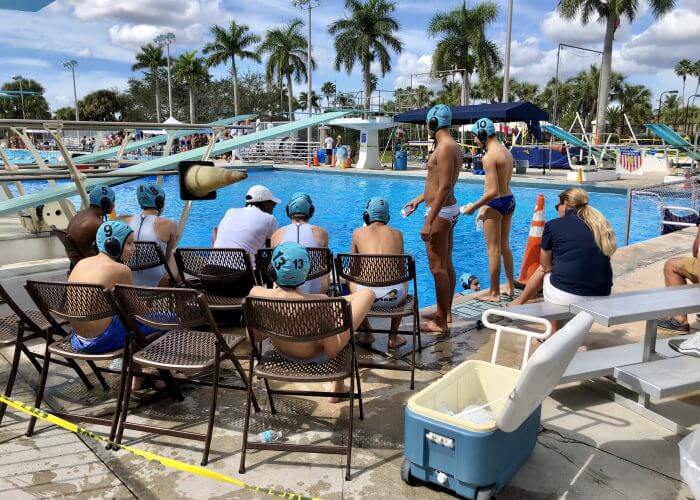
Polo in Paradise; a view from behind the Miami Riptides bench. Photo Courtesy: Annie Tworoger / 3rd & Ocean
Goldenberg is quick to acknowledge this fact—and to draw a contrast with the verdant SoCal and NorCal polo scenes.
“People in Southern California and even Northern California—those areas are over-saturated with competition,” he said. “To them it’s not much fun because they have it almost every weekend.
“To these kids that live on the East Coast, South Florida, other countries—when they come here, they enjoy every single game because games [for them] don’t happen as often. And high-level games happen even less….”
Which is not to say that all West Coasters are oblivious to what’s happening in the distant East or that California isn’t represented among the Invitational’s competition.
Year after year, the Olympic Reserve Water Polo Club (ORWP), for example, a primarily Armenian organization, makes the trip from Glendale, California; ORWP’s coach Davo Gharagezyan started coming when he was a 16U player more than a decade ago.
“We’ve been on and off throughout the years. It’s a great tournament, well-hosted, and the weather’s really beautiful,” Gharagezyan said after his club, consisting mostly of 16U athletes, claimed silver in the 19U boys bracket. Despite the distance and the loss in the finals, he has no regrets.
“Even though I would have loved to win this game just as a coach, I’m very proud of what they did. Just to be in second place is a huge deal.”
There’s a global esprit de corps that generally exists among the polo community that seems especially heightened here, with Cubans and others from the Miami region speaking Spanish both inside and outside the pool, while snippets of various Soviet republic languages—Goldenberg emigrated from Russia more than two decades ago—bubble up from spectators and combatants alike.
For the group of young men from Campus Roma who traveled more than 5,000 miles to play a total of ten matches, the revelation was in both the competition and the environment. But all appeared satisfied with their visit and a fourth-place finish for their 16U boys, coupled with a tenth-place finish in 19U.
Riccardo DiGiuseppe, Campus Roma’s 15-year-old goalie, was frank about the challenge of another style of play—and what it means for his team’s development. “My teammates and I learned a lot at this tournament,” he said. “We were so used to the Italian way; now we know the American way.”
Their team organizer is Alain Guillen, a Cuban native now at home in South Florida. Tall, fit and distinguished looking—Miami suits him perfectly—Guillen was philosophical about the benefits of the American polo experience for his young charges.
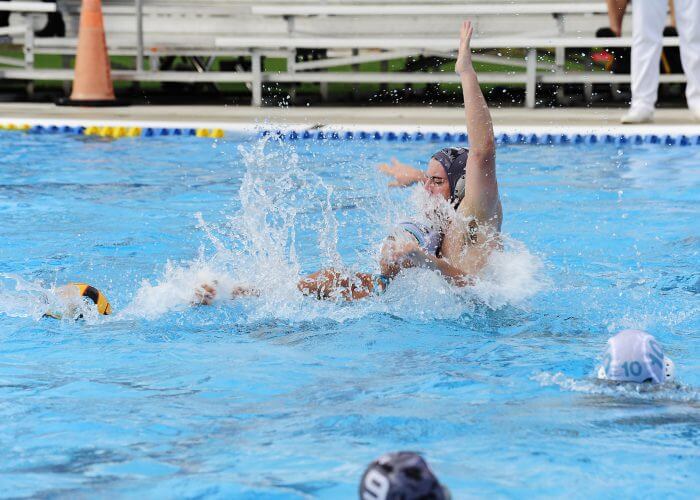
There’s NO question that polo’s a physical game. Photo Courtesy: Annie Tworoger / 3rd & Ocean
“The most important thing that they’re going to bring back to Italy from water polo down here is that the style of play is so different,” he said. “In Europe and in Italy, it’s so physical—so they can get away with a lot—grabbing and pushing—and the referees don’t call much.
“Here, they don’t allow a lot. I guess it has to do with safety and the philosophy in America. This has been an extreme contrast for them and they feel frustrated.”
In a sly understatement with reference to possible future Roma journeys, Coach Guillen added, “It’s something that next time they need to adjust to.”
Excellence in every area—and an audition opportunity
As Goldenberg noted, the essential attribute of the tournament is quality—meaning not just the facilities and the competition but also referees. In this, the South Florida International is certainly fortunate that its chief organizer just happens to be one of the top referees in America. Goldenberg recruited his buddies from all around the world and—despite what parents, players and coaches might say—they are some of the finest officials anywhere.
One such man in white—or in this case, the teal blue that signifies this year’s Invitational—is Alex Stankevitch. A FINA-rated official who, by some measures, is considered our country’s top referee, Stankovitch is generous with his time and opinions. It’s all in the service of making polo better, especially on the East Coast, where he lives and where he saw only positives for both international and national teams who took the Presidents’ Day holiday plunge in the South Florida pools.
“It’s a great opportunity for American teams to be involved in this tournament, because there so many different ways of playing the game represented here.” Said the veteran referee, “Teams from different countries and different continents do play in a different way. It is good for our kids to experience the game when it’s not played the way it’s often played in California. Our players should have more exposure to these kind of games….
An indicator of the lure of this tournament is the dedication of the Calgary Renegades, who also traveled great distances to compete in the Invitational—and have done so for as long as head coach Brooke Coburn can remember.
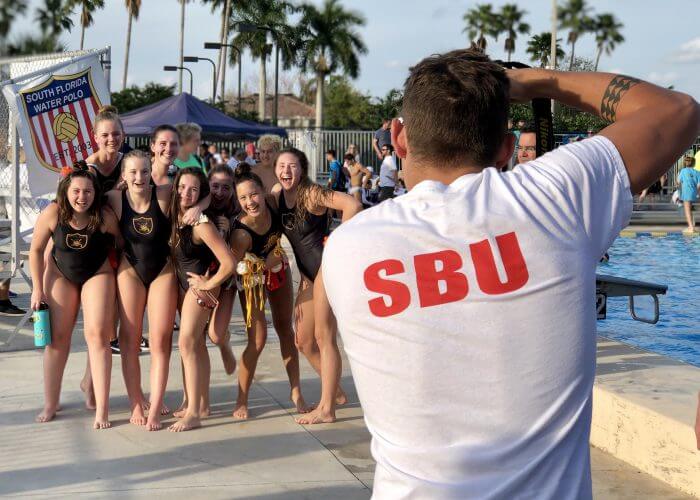
Joy is in ample supply in South Florida. Photo Courtesy: Annie Tworoger / 3rd & Ocean
“I’ve been coming on and off since 2009,” she recounted. “For a while we were coming every year. In the past, we’ve had some very good competition—and we enjoy the sun. We came out four days earlier to get some good training in and development. That really is what this is for—getting some unity as a team and individual drills and tactics.”
That, and some important exposure, not only to the American style of play but also to NCAA varsity coaches who might be in the stands to observe and recruit. Coburn, who said she’s been playing polo for 26 years, found her way from Calgary to Bloomington, where she played for years under Barry King at Indiana.
The Canadian talent pipeline from Calgary has proven to be quite generous to U.S. coaches; Kyra Christmas, star lefty for the Pacific Tigers and the 2018 Golden Coast Conference Player of the Year, is a Renegades graduate who spent many a Presidents’ Day weekend in South Florida.
Home girls in SoFlo
Unmistakable in the shimmering sun are Donna Johnson and her younger daughter Chelsea. Now graduated from a four-year stint at Princeton University, where she and her older sister Ashleigh changed the trajectory of Tiger polo, probably forever, Chelsea seems entirely at home among the parents and players from the Miami Riptides, where she, her sister and their three brothers first learned the sport.
Now a coach under legendary Riptides Head Coach Carroll Vaughan, the younger Johnson is clear what has compelled her to devote a lifetime to what is often an unforgiving athletic pursuit.
“It’s the people that you meet that have made this a home for me,” she said. “I just love playing this sport with people that I’ve known for my whole life. So, my connection is both to the sport and my club.
“I’ve been playing water polo for a really long time. I can’t see myself without it,” she confessed.
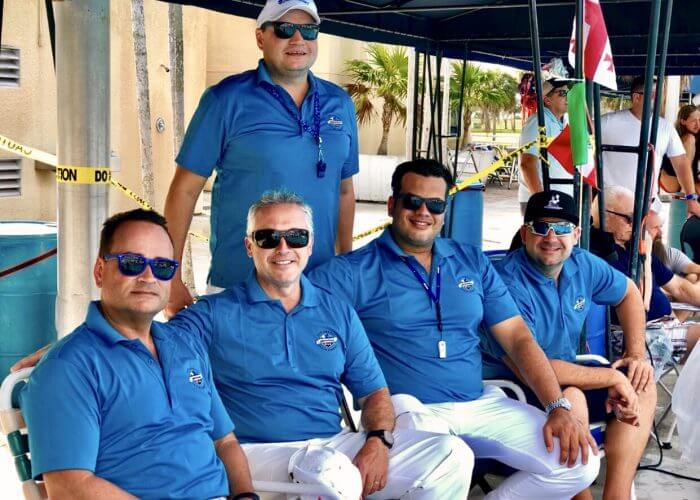
Everything at the Invitational was top-notch, including the officiating. From left to right: Irakli Sanadze,
Val Vasilchikov, Ulrich Grude, Jose Garcia. Standing is Alex Stankevitch. Photo Courtesy: Annie Tworoger / 3rd & Ocean
Donna, the Johnson family matriarch, is equally at home among the varied polo groups assembled at the Coral Springs Aquatics Center; in fact, for someone who knew nothing about the sport until her children became some of the country’s best practitioners, it makes perfect sense that Donna Johnson is now a water polo lifer—in her own, quiet way.
“I’m not really evangelical about it; I don’t go out looking for people to play water polo at all, “ said Johnson, whose daughter Ashleigh likely is one of the world’s most recognizable polo athletes. “But people have asked me because of Ashleigh, how they can get their children into water polo. I of course refer them to the Riptides.”
Goldenberg’s deep satisfaction
And as the Miami sun begins to set on what has been a successful and satisfying event on every level, South Florida Water Polo’s primary evangelist takes a moment to savor the warm glow of a job well done.
“It’s like a holiday for everyone—especially when the weather cooperates,” said Michael Goldenberg. “It makes everything just great!”




Congratulations on a great tournament and international outreach! “In a rising tide all ships float higher”